The March 31, 2024 local elections, which changed Turkey’s political climate, were a turning point in three respects.
1- While President and AK Party leader Tayyip Erdoğan expected a great victory, he suffered a real defeat. In the words he used in his balcony speech with only his wife Emine Erdoğan by his side, this was the breaking point of 21 years of AK Party rule. We can say that the descent has begun.
2- Erdoğan now has not one but two strong rivals who can defeat him in the presidency. Ekrem İmamoğlu in Istanbul and Mansur Yavaş in Ankara have become natural leaders in Turkish politics.
3- After the 2023 defeat, when the CHP seemed weakest, it got one of the strongest results in its history. After the 41 percent in the 1977 election under the leadership of Bülent Ecevit, Özgür Özel (according to the results of the provincial general assembly, which is considered the general vote measure in local elections) increased the CHP to 37 percent. The AK Party became the second party with 35 percent.
These three turning points are the strongest indicators of a change in the political climate.
Three main reasons for transformation
There were three main reasons for this break:
1- The economic crisis was by far the biggest cause of the tidal wave that hit Erdoğan and his government. The reaction of pensioners, laborers and the unemployed came out for the first time in years. Yes, there were the same difficulties in 2023. But then pensioners and laborers still had hope in Erdoğan. The constant postponement of the empty promises made before these elections, and finally Erdoğan’s “bottomless well” analogy for pensions, as if he was not the one digging that inflation well, was the point where the knife was to the bone. Erdoğan paid the bill for underestimating the reaction of pensioners and laborers.
2- The new administration of the CHP, which was formed after the 2023 defeat by replacing Kemal Kılıçdaroğlu with Özgür Özel through a congress, took a risk and succeeded with its organizational approach and working style. They defeated Erdoğan with a team that was younger and based on the party organization. Imamoğlu in Istanbul and Yavaş in Ankara made a vital contribution to this result with their voting potential among the CHP’s core voters.
3- Arrogance. The main purpose of Erdoğan’s preferences for Murat Kurum in Istanbul and Turgut Altınok in Ankara was the logic of “the horn should not cross the ear”. They were chosen to ensure that the votes actually went to Erdoğan. It was also a sign of arrogance that Erdoğan did not take the Welfare Party and the Grand Union Party into consideration when choosing candidates. He paid the price with two metropolitan mayorships; Şanlıurfa was won by Yeniden Refah and Sivas by the BBP.
Election losers
Besides Erdoğan, there were three losers of the election:
1- Meral Akşener. Akşener’s attack on the CHP, her 2019 and 2023 ally, rather than Erdoğan and the AK Party in the local elections backfired. The IYI Party dropped to almost half of the 9.69 votes it received in 2023. In the first hours of the election, calls for her resignation started from within her party.
2- Devlet Bahçeli. The MHP’s votes also halved to 5 percent. They lost the mayorships they held. The most important of these was the loss of Manisa Metropolitan Municipality, which they had gained with the support of the AK Party, to the CHP, which is also Özel’s home-town. Similarly, the municipality of Kütahya went from the MHP to the CHP – for the first time since 1950.
3- DEM. The injustice suffered by the DEM Party due to the votes of military troops deployed to the east and southeast on security grounds is a separate issue; it was an example of electoral injustice. However, their results in cities such as Istanbul, Izmir, Ankara, Mersin, Adana and Antalya, where there is a significant Kurdish voter population, showed that identity politics in metropolitan cities has started to dissolve.
Election winners
Apart from İmamoğlu and Yavaş, the three winners of the election can be listed as follows:
1- Fatih Erbakan. Erbakan, the leader of Yeniden Refah, took a strategic step by not entering the election under the AK Party umbrella. Since Erbakan’s statement to YetkinReport, “We will not be a spare tire,” the People’s Alliance has been shaken. Erdogan’s denunciation of Israeli politics was especially effective. It emerged as the third party with 60 mayorships, including Şanlıurfa and Yozgat, and 6 percent of the provincial general assembly votes.
2- Özgür Özel. He was a living example of the saying that nothing can replace success, that success covers all flaws. He worked without paying attention to Imamoğlu’s influential broadcasts. He trusted the party organization, especially the youth branches. Sinem Dedetaş is an example of this politics. Instead of names recruited from right-wing parties, an activist, modern female engineer like Dedetaş was elected mayor in the conservative Üsküdar district, where Erdoğan’s house is located. In Istanbul, the number of women candidates and votes could have increased even more with Aslı Öymen in Adalar and Tülin Hadi in Kadıköy. But like Alper Taşdelen in Çankaya, Ankara, they were blocked by internal party factions.
3- Özer Sencar. A week before the election, MetroPoll research manager Özer Sencar said on YetkinReport YouTube broadcast that İmamoğlu would win by 9 points and Yavaş would win by a clear margin that “cannot be closed anymore” and that a nationwide bottom wave was coming. Later, he emphasized this even more strongly to Ruşen Çakır on MedyaScope, insisting on his predictions based on findings and calculations. He became another winner of the election.
